The core capability with precise machining, fast lead time, and sufficient engineering support
Papler Industry provides high-precision CNC milling and CNC turning operations to make complex tooling, functional prototypes, and end-parts for various industry applications. We work with different engineering-grade materials like metals, plastics to make high-quality custom CNC machining parts and components delivered to specifications. With an excellent range of finishing services, pronounced product quality, on-time delivery, and service diversity, we can take care of all your CNC machining needing from you! Our in-house capabilities and quality control are defined to deliver the best output fitting your specification and standard with high repeatability and scalability. We are an experienced team and we will try our best to evaluate your project, production design, and suggest the best approach from process to material and budget.
OUR SERVICES
What is CNC Machining?
CNC stands for computerized numerical control. CNC machining is an automatic manufacturing technique that is used to make parts by cutting and turning. The process involves the use of cutting tools that systemically remove materials from a material block or workpiece in a manner dictated by the design file. The process continues until the final product or part is made. CNC machining operations are diverse and highly precise. It is widely used for making high-quality end parts in low to mid volumes. CNC machining is also used in intricate processes like rapid prototyping and mold making for injection molding and die casting. CNC machining can even finish parts made through other methods via etching, engraving, and more.
While CNC machining takes several forms, its CNC milling and CNC turning (CNC lathe) operations are the most common in industrial production. CNC machining services are specifically employed for applications that require high accuracy, tight tolerances, and high functionality.
At Papler Industry, we offer high-precision multi-axis CNC machining operations. We can make quality parts for all our clients with our 3-axis, 4-axis, and 5-axis CNC machines that are all suited for CNC milling and CNC turning processes.
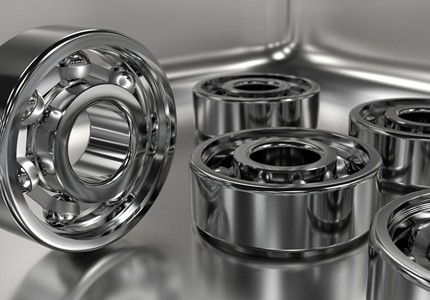
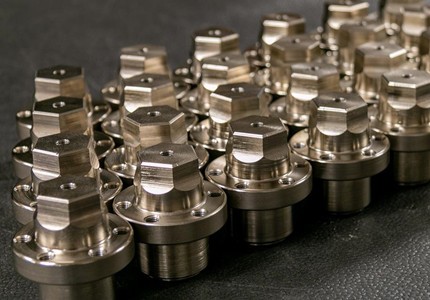
CNC Milling
CNC milling is an essential process of using CNC mill and computer to designate specific milling and drilling along axes to cut the material into the pre-set specifications and dimensions. During milling operations, the workpiece and material to be milled is held stationary, while the cutting tool revolves around it to form the final part. The cutting tool's motion is dictated by the toolpath, which is contained in the computer-aided design (CAD) file. At Papler Industry, our CNC milling processes can make ball joints, valve bodies, spindles, brackets, swiss equipment, and other parts with complex geometries.
CNC Turning
CNC turning, like CNC milling, is also used to remove material from a workpiece. Turning operations, however, removes material from the workpiece by rotating the workpiece around the stationery tool. CNC turning is more suitable for making parts with round, cylindrical shapes, threads, and internal bores. CNC turning is also relatively more affordable than milling because of the size of the materials and the speed of machining. After turning operations have been completed, the workpiece may be transferred to a CNC mill to add features and finishing that may not be possible with CNC turning.
Applications of CNC Machining
• Rapid Tooling
CNC machining can make aluminum and steel cavities and tools for injection molding and die casting operations. CNC machining services can deliver the tight tolerances, precision, and detail required for making a great tool. We can also use CNC machining to create master patterns for vacuum casting operations.
• Prototyping
CNC machining services can be used with digital manufacturing solutions and CAD data files to make on-demand prototypes for trials, idea validation, consumer testing, investment pitch, and pilot trails. CNC-machined prototypes are excellent for functional testing and can be made in production-grade materials, helping you to accelerate your product development cycles where possible.
• Low-volume production
CNC machining services are used for making low to mid-range volumes of functional parts and components. The high accuracy, automation, and speed of CNC machines make them ideal for urgent parts that require tight tolerances and dimensional accuracy. CNC machining is often used for critical components in the medicine, robotics, and aerospace industries.
• Custom fixtures
CNC machining can create small batches of customized parts to meet the demands of specific audiences and markets. CNC machining is also applied for making specialty parts, tooling, and task-specific spare parts for use across various industries. We can also use CNC machines to make custom jigs and fixtures for direct mechanical end-uses.
• Finishing solutions
CNC machining is used for finishing parts that have been machined or those manufactured through other means. CNC machining can texture, mill, engrave, etch, and mark parts' surface to deliver desired finishes with accuracy and precision.
Our Machining Capabilities
3-Axis CNC Machining
Standard CNC machining operations for performing milling operations along X, Y, and Z axes. 3-axis machining is relatively simple, allowing the cutting tool to move back to front, side to side, and up and down.
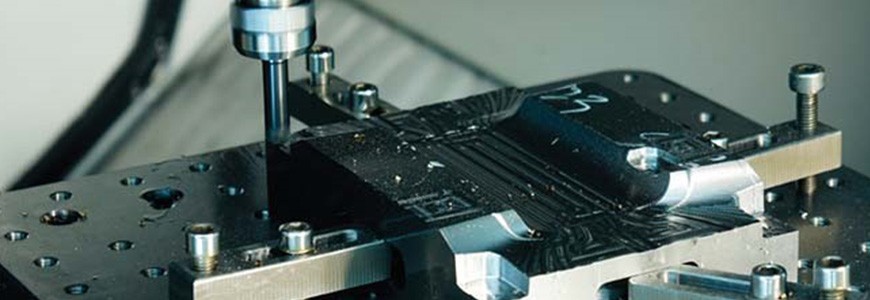
4-Axis CNC machining
The 4-axis CNC machine creates part in the same manner as the 3-axis machines but includes an extra A-axis that facilitates the cutting tool's rotation along the X-axis. 4-axis CNC machining is very useful for cutting operations that require holes and cut-outs to be made around a cylinder or inside a piece.
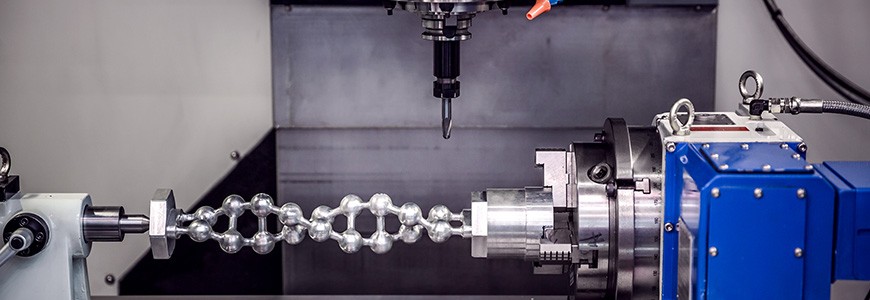
5-Axis CNC machining
5-Axis CNC machines consist of all the axes in the 4-axis setup, with an additional B-axis. These are the best type of CNC machines available in the market today, perfect for creating intricate parts and precise geometries for artificial bones, automotive uses, and aerospace components. The 5th B-axis allows for more precision and control as it rotates around the Y-axis in the X-Y-Z plane. 5-axis machines are fast and efficient. They also offer single-step machining that shortens lead time and improves tool efficiency.
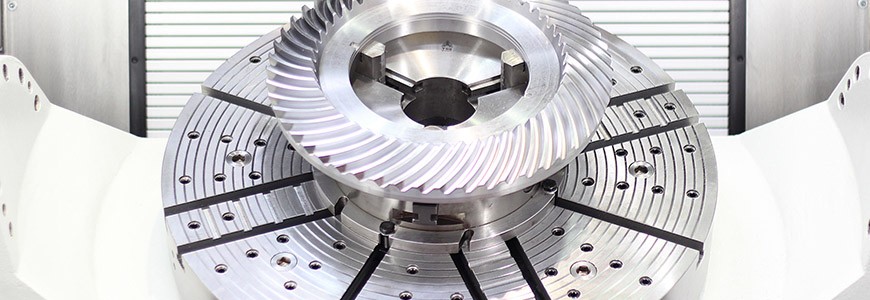
Advantages of CNC Machining
1. Precision and Tight tolerances
 CNC machining services are mostly free of human intervention. This makes them capable of producing parts with high precision, attention to detail, and dimensional accuracy. The setup and design freedom of their automated controls along up to 5 axes make CNC machining a top pick for applications where tight tolerances are crucial to product functionality.
CNC machining services are mostly free of human intervention. This makes them capable of producing parts with high precision, attention to detail, and dimensional accuracy. The setup and design freedom of their automated controls along up to 5 axes make CNC machining a top pick for applications where tight tolerances are crucial to product functionality.
2. Low-volume production
 CNC machining has a relatively lower tooling cost for making parts than die casting and injection molding. Its ability to work with low to medium budgets and the lack of hard tooling make it an excellent solution to make small batches of high-quality custom parts, rapid prototyping, and tooling. Our low-volume parts can be used for pilot testing, bridge tooling, and quicker market introduction before mass production commences.
CNC machining has a relatively lower tooling cost for making parts than die casting and injection molding. Its ability to work with low to medium budgets and the lack of hard tooling make it an excellent solution to make small batches of high-quality custom parts, rapid prototyping, and tooling. Our low-volume parts can be used for pilot testing, bridge tooling, and quicker market introduction before mass production commences.
3. Material selection

CNC machining can work with a wide variety of material categories, including metals, plastics, and so on.
4. Rapid Turnaround
 The automatic nature of CNC machining allows for quick and precise cuts into the workpiece in a toolpath that has already been defined by the G-code/CAD file. CNC machining operations also do not need time-consuming hard tooling, and will make prototypes and finished parts in hours.
The automatic nature of CNC machining allows for quick and precise cuts into the workpiece in a toolpath that has already been defined by the G-code/CAD file. CNC machining operations also do not need time-consuming hard tooling, and will make prototypes and finished parts in hours.
5. Finishing options
 CNC machining can finish parts by modifying surface texture. It can also be used for engraving, etching, and inscription on manufactured parts. Also, parts that have been CNC machined themselves can be subjected to a wide array of finishing services includes anodizing, painting, plating, and so on.
CNC machining can finish parts by modifying surface texture. It can also be used for engraving, etching, and inscription on manufactured parts. Also, parts that have been CNC machined themselves can be subjected to a wide array of finishing services includes anodizing, painting, plating, and so on.
Why You Should Choose Papler Industry For CNC Machining
• No minimum quantity required
At Papler Industry, our CNC machining services are available to all clients without any restrictions and minimum order quantities. We can make CNC machined parts varying in volumes from a single piece up to their hundreds.
• Efficient Low volume production
Papler Industry’ low-volume manufacturing services are optimized to deliver the best value for money without compromising quality. We know how to optimize our tool, manage our team, and use the specific machines for an efficient low-volume production process. We generally can save more lead time than our competitors and offer a competitive quote for small batches of production runs.
• Quick turnaround delivery
At Papler Industry, we understand the essence of a quick turnaround and on-time delivery. With our optimized quality control, supply chain, and delivery logistics, you can be assured of receiving your CNC machined parts on or before agreed timelines. We are dedicated to helping you iterate and produce as many parts as possible in the shortest time frame.
• In-house capabilities
Our manufacturing facilities consist of a full one-stop-shop range of services. That means you do not have to worry about outsourcing any production or finishing service in your prototyping and product development cycles. Our machining capabilities of 3, 4, and 5-axis machining centers help you eliminate costly downtimes and reach your market quicker than the competition.
• Multi-axis machining
You will benefit from our state-of-the-art multi-axis machining capabilities that cover design, prototype, and production needs. At Papler Industry, we use our 4 and 5-axis CNC machines to quickly and accurately fabricate parts with the most complex geometries.
• Uniformity and consistency
Our quality control system and manufacturing standards guarantee that all of your products will be delivered uniformly and consistently across material and other functional product properties.
• Material options and finishing
We provide quality CNC machining services with a decent range of production-grade materials and finishing options to compliment your parts' beauty, appearance, and functionality.
CNC Material Selection Range
Our CNC machining services offer a complete material selection range. At Papler Industry, we can work with various materials, including metal and plastic, to machine your product prototypes and low-volume production parts. Some of our material options include:
Thermoplastics: • ABS • Acrylic • Delrin • HDPE • Nylon • PTFE • PC • PP
Metals: • Aluminum • Steel • Magnesium • Brass • Zinc • Copper • Titanium
Others: • Ceramic
CNC Machining Across Industries
CNC machining is used across industries for qualitative product development and concept testing. CNC machining also helps to shorten product development cycles, improve learning, and enhance product functionality and enhancement in a wide range of sectors. Papler Industry is trusted by diverse clients from different industries. Here are some of the industries that we serve:
• Aerospace
• Automotive
• Medical
• Energy & Power
• Robotics and Automation
• Industrial manufacturing
• R&D
• Agriculture
• Education
• Electronics & Semiconductors
• Consumer Products
Our Technical Specifications
• Maximum Part Size: 1600*1300*1000 mm
• Machining accuracy: 0.005mm-0.20mm
• Minimum machined radius: 0.2mm
• Minimum machined thickness: 0.1mm
• Surface finish: Ra0.2 - Ra1.6
CNC Machining FAQs
1. What determines the price of my CNC machining project?
The cost of any CNC machining project depends on the type of material and its cost, the machining time, the nature of tolerances required, the need for hole tapping, and the kind of surface finish.
2. What can I do to reduce CNC machining costs?
i. Avoid creating designs with sharp internal corners and use inner radii at the corners of your design.
ii. Where possible, design all parts with standard sizes. For instance, it is more affordable and cost-effective to make parts that measure 10m in height than 10.5m, as the latter requires human intervention.
iii. Try to design parts for CNC prototyping without a draft.
iv. Simplify the part design to reduce the angles and sides from which the part will need to be machined. With more angles, axes, and sides for part machining, the cost would be higher.
3. What is Papler Industry’s standard tolerance for CNC machining operations?
At Papler Industry, we use the DIN ISO 2768 general tolerances for part machining. We use the fine-class tolerance specifications for metal machining, while for plastics, we use the medium-class as our reference.
4. How do I specify that my part needs to have sharp edges?
You can communicate your design needs to us with our “request a quote” form, or add a note in your drawing files before upload.
5. Can Papler Industry machine ceramic?
Yes, at Papler Industry, we can machine alumina Al2O3.
6. Can Papler Industry machine the wood?
No, we can't machine wood at the moment.
7. Do you install pins and threaded inserts?
Yes, Papler Industry can install pins and threaded inserts for you.
8. What part finish can I expect?
Projects without specified finishes can expect CNC-machined parts to be delivered without any markings or signs of oxidation. Parts may be left as machined or smoothed with sanding operations. The type of finish depends on the application of the parts.
9. Can I supply my raw material?
Yes. However, we shall need to run identification and analysis on the material to ensure it can be machined.
10. Can you do post-machining operations to our earlier fabricated parts?
No, we do not offer post-machining for parts that have not been fabricated by us.
11. For plastics, how can you handle parts with complex structures?
We split the parts for the CNC machining operations and use adhesives to assemble them subsequently.
12. What plastics do you use adhesives for when prototyping with CNC?
Generally, PC, ABS, PMMA, PC/ABS can be joined with glues and adhesives.